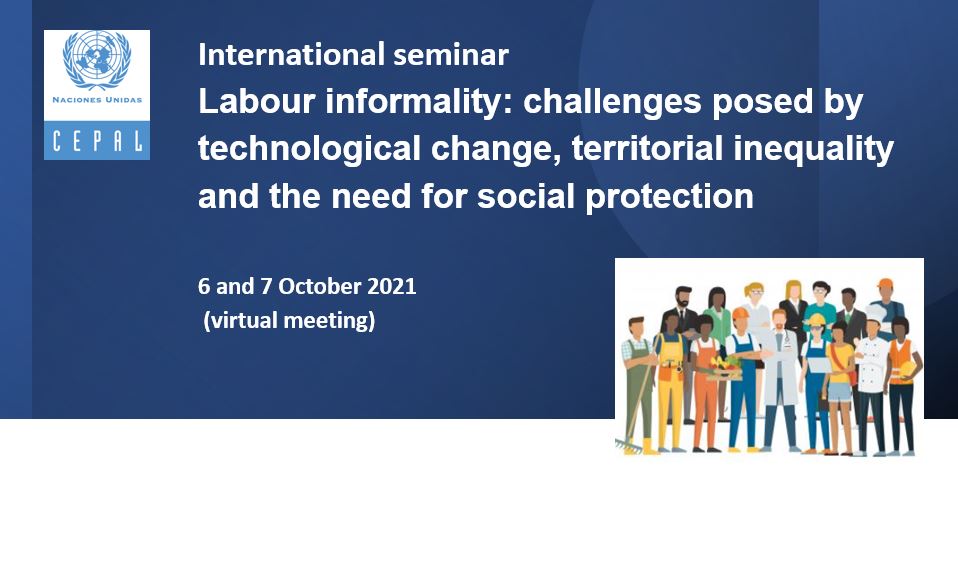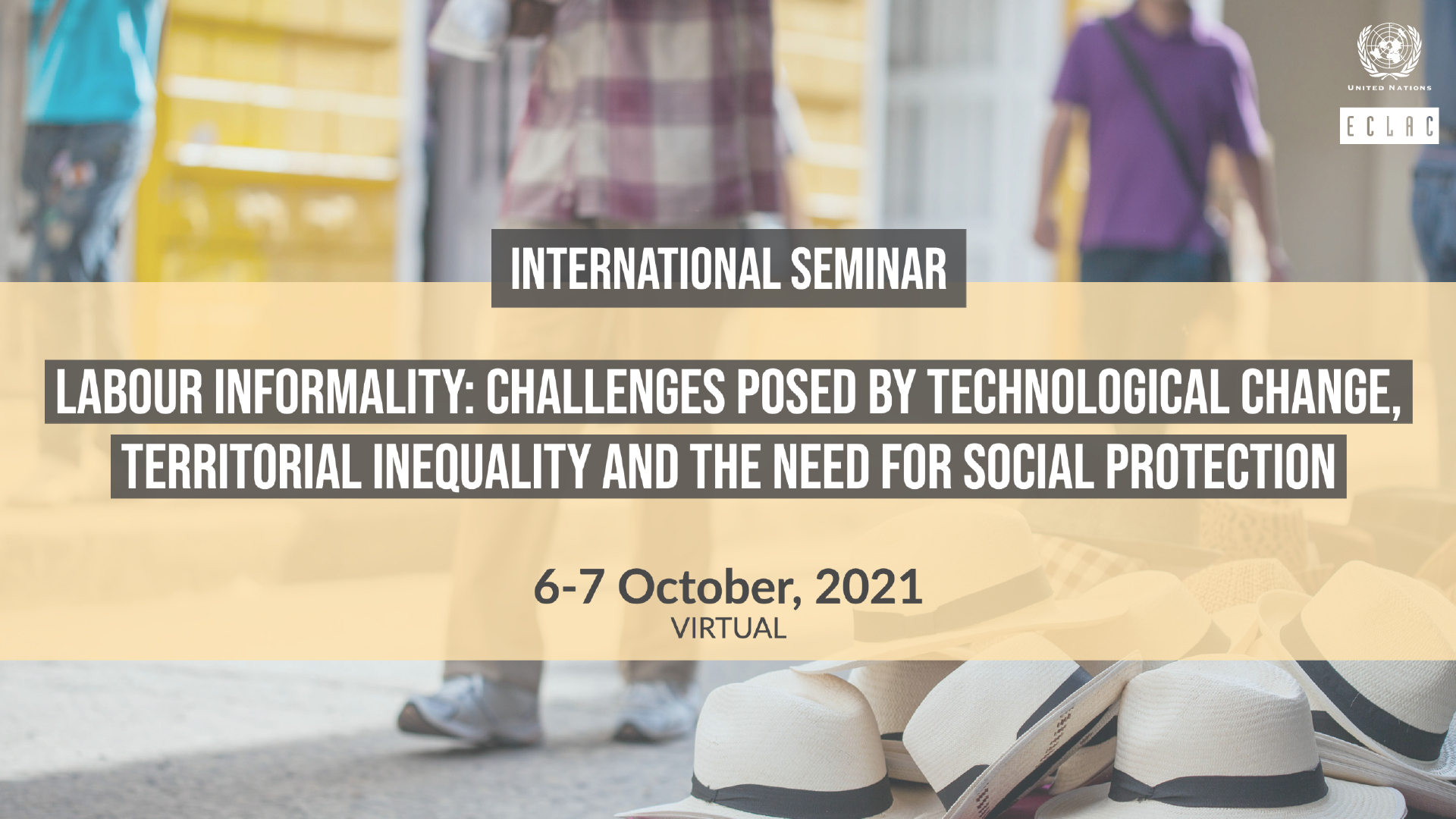International seminar "Labour informality: challenges posed by technological change, territorial inequality and the need for social protection"
Teaser
This virtual seminar aims to promote regional and interregional dialogue, based on the main findings of the project “Technological transformations in Latin America: promoting productive jobs and confronting the challenge of new forms of informal employment”, which has been implemented in seven Latin American countries (Argentina, Chile, Colombia, Ecuador, Peru, Mexico and Uruguay), identifying policy recommendations and key milestones for implementation.
Event information

Date
6 - 07 Oct 2021, 07:00 - 14:00Event type
Participation
Rapid technological progress has changed Latin American societies and labour markets profoundly. It has facilitated the expansion of new business models, mainly those related to services mediated by digital platforms. This includes web-based work, where a platform intermediates between the worker and the employer, who can be anywhere in the world, and location-based work. Although the latter has generated many employment possibilities mainly in large cities, the jobs in question lack a standard employment relationship and thus access to social protection. Similarly, technological advances have impacted the daily work of many occupations, transforming the worker skills that are most highly valued. In this context, the workers who are most adaptable and have greatest access to technology and digital skills will benefit the most.
These changes are occurring in societies in which labour informality is a structural phenomenon, where many workers lack the minimum conditions of decent jobs (no employment contracts, no health or pension coverage or other social protection services). The phenomenon of informality cuts across the axes of social inequality in the region, giving rise to significant gender, ethnic and racial, age and, especially, territorial inequalities.
The coronavirus disease (COVID-19) pandemic has hastened these changes and, unless rapid action is taken, there is a risk that the gaps that already exist will widen. In the next few years, governments must prepare to build a solid institutional framework that will enable them to take advantage of technological progress to promote decent work and reduce inequality.
Objective: The seminar aims to promote regional and interregional dialogue, based on the main findings of the project “Technological transformations in Latin America: promoting productive jobs and confronting the challenge of new forms of informal employment”, which has been implemented in seven Latin American countries (Argentina, Chile, Colombia, Ecuador, Peru, Mexico and Uruguay), identifying policy recommendations and key milestones for implementation.
https://www.cepal.org/en/technological-transformations-latin-america-productive-jobs
Programme of work
Apertura
Daniel Titelman, Director de la División de Desarrollo Económico, CEPAL
Alberto Arenas de Mesa, Director de la División de Desarrollo Social, CEPAL
Panel 1
Modera:
Jürgen Weller, Consultor Internacional, División de Desarrollo Económico, CEPAL
Colombia “Promoción del trabajo decente para los trabajadores de plataforma en Colombia” David Bardey, Consultor CEPAL, Universidad de los Andes
México “Ocupaciones emergentes en la economía digital y su regulación en México” Graciela Bensusan, Consultora CEPAL
Chile “Trabajo de plataformas en Chile y desafíos para el trabajo decente” Pablo Morris, Consultor CEPAL
Caribe “Trabajo decente para los trabajadores del Caribe” Reynold Simons, Especialista en Mercado Laboral
Presentation(s)
Comentarios
Sr. Andrés Uribe Medina, Viceministro de Empleo y Pensiones, Ministerio de Trabajo de Colombia
Mtro. Omar Nacib Estefan Fuentes, Director General de Previsión Social, Secretaría del Trabajo y Previsión Social, México
Sr Arturo Arriagada - Fairwork
Presentation(s)
Preguntas y respuestas
Cierre
Panel 2: Cambio tecnológico y habilidades para el futuro
Modera:
Sonia Gontero, Oficial de Asuntos Económicos, División de Desarrollo Económico, CEPAL
Medición de desajuste de habilidades en América Latina, Rafael Novella, Consultor CEPAL
O*NET Uruguay. Metodologías para la utilización de información sobre habilidades a partir de encuestas ocupacionales, Miguel Velardez, Consultor CEPAL
Big Data. Utilización de vacantes de empleo para la identificación de demanda y oferta de habilidades, Emanuel Menendez, Consultor CEPAL
Presentation(s)
Comentarios
Sra. Maria José Gonzalez, Ministerio de Trabajo y Seguridad Social, Uruguay
Sr. Felipe Mc Rostie, Servicio Nacional de Capacitación y Empleo (SENCE), Chile
Sr. Juan Manuel Rodríguez Bas, ex director del INEFOP, Uruguay
Presentation(s)
Preguntas y respuestas
Saludo de bienvenida
Martín Abeles, Director de la Oficina de la CEPAL en Buenos Aires
Panel 3: La protección social de los trabajadores informales
Modera:
Claudia Robles, Oficial de Asuntos Sociales, División de Desarrollo Social, CEPAL
Políticas para enfrentar los desafíos de las antiguas y nuevas formas de informalidad en América Latina, Laís Abramo, Consultora Internacional, División de Desarrollo Social, CEPAL
La protección social de los trabajadores informales ante los impactos del COVID–19, Mario Velásquez, Consultor Internacional, CEPAL
Política social en el contexto COVID y la recuperación. La experiencia de la Argentina, Vanesa Wainstein, Asesora Especial para Asuntos y Relaciones Internacionales de la Unidad Ministro, Ministerio de Desarrollo Social, Argentina
Políticas de protección social frente al COVID-19, Representante del Ministerio de Desarrollo e Inclusión Social (MIDIS), Perú (TBC)
Presentation(s)
Comentarios
Roxana Maurizio, Especialista Regional en Economía Laboral para América Latina y el Caribe, Organización Internacional del Trabajo (OIT)
Laura Alfers, Directora del Programa de Protección Social, Women in Informal Employment: Globalizing and Organizing (WIEGO)
Presentation(s)
Preguntas y discusión
Panel 4: Informalidad laboral a nivel subnacional
Modera: Soledad Villafañe, Oficial de Asuntos Económicos, Oficina de Buenos Aires, CEPAL
Propuesta de estimación de la Informalidad a nivel subnacional y resultados de la estimación de la informalidad a nivel distrital en Perú, Andrés Espejo, Consultor, División de Desarrollo Social, CEPAL
Estimación de la informalidad en los departamentos de Argentina, Lucía Trujillo, Consultora CEPAL
Estimación de la informalidad en las comunas de Chile, Felipe Livert, Consultor, CEPAL y Fidel Miranda, Consultor, CEPAL
Estimación de la informalidad en los municipios México, Eduardo Ibarra-Olivo, Consultor CEPAL
Presentation(s)
Comentarios
Humberto Soto, Oficial de Asuntos Sociales de la Sede Subregional de la CEPAL en México (TBC)
Fabio Bertranou, Director Oficina de la OIT para el Cono Sur de América Latina
Preguntas y discusión
Practical information
Related content

The COVID-19 crisis has reaffirmed the importance of harnessing technological advances and exposing territorial inequalities to promote decent jobs in Latin America, underlined specialists at an event on informal labor
An international seminar organized by ECLAC on October 6-7 announced the key findings of a project financed by the United Nations Development Account.
Attachment(s)
-
Preliminary programme International Seminar Informality_v051021.pdf
Non paper Laís Abramo Políticas para enfrentar informalidad 29_09
Arriagada_Fairwork_Chile_0.pdf
Bardey_David_Panel_1_Colombia_final_0.pdf
Bensusan_Graciela_Panel_1_Mexico_final_0.pdf
Menendez_Emanuel_Panel_2-final_0.pdf
Morris_Pablo_Panel_1_Chile_final_0.pdf
Novella_Rafael_Panel_2-final_0.pdf
Velardez_Miguel_Panel_2_vpdf_0.pdf
Espejo_Andres_panel_4_0.pdf
Ibarra_Mexico_panel_4_0.pdf
Abramo_Lais_panel_3_0.pdf
Livert-Miranda_Chile_panel_4_0.pdf
Velasquez_Mario_panel_3_0.pdf
Trujillo_Argentina_panel_4_0.pdf
Uruguay2021_10_coment_0.pdf